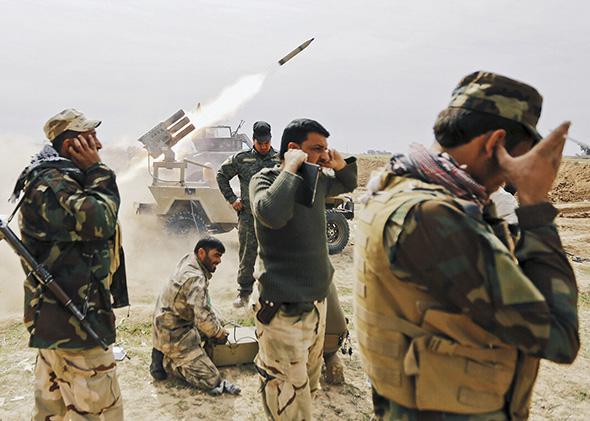Iraqi Prime Minister Haider al-Abadi was in the U.S. last month, begging for arms and cash in order to fight ISIS. His requests come none too soon; the Iraqi military is reportedly gearing up for a summer offensive against ISIS in Anbar Province. But the impending series of battles will result in little intelligence gathered for the conflict-to-come in Mosul, Syria, and elsewhere. This spells bad news for Baghdad, Washington—and Tehran.
Why? Here’s one answer: Buried in a recent New York Times article about Iraq’s liberation of Tikrit from ISIS is this startling fact: The Iraqi militias battling ISIS took no prisoners of war. That was despite a fierce series of battles taking place in a dense urban area, resulting in hundreds, if not thousands, of casualties.
To take zero prisoners during a major military operation probably means only one thing: Iranian-backed militias executed every single ISIS fighter they found under any and all circumstances. One spokesperson for the Badr brigade copped to as much. He said, “To be honest, everywhere we captured them we killed them because they were the enemy.”
Another battalion commander said his troops caught three Afghan men, an Algerian man, and an Afghan woman, during the fight. And, as he noted, “After we were done with them, we killed them.”
Iranian-backed proxies have been carrying out many brutal acts in the fight against ISIS. For example, Human Rights Watch recently published a 31-page report that documented a mix of militiamen and volunteer fighters committing wide-scale destruction in and around Amerli. This was the town where Shia irregulars, Kurdish and Iraqi troops, Iranian handlers, and American airpower successfully pushed back ISIS fighters last fall. Furthermore, Shia groups and Iraqi forces have been accused of carrying out summary executions multiple times in the last year—including a particularly gruesome murder recently witnessed by two Reuters reporters.
It goes without saying it’s against the laws of war to commit atrocities. Of course, in the heat of battle, incredible brutality can and will occur, and ISIS has gleefully slaughtered thousands of captured troops and broadcast their executions on the Internet. But that doesn’t mean Iraqi forces—even the Shia irregulars who did much of the fighting in Tikrit—should engage in atrocities as well. Not only is this an ugly war crime, but it also is a terrible way to win the greater battle for the integrity of the Iraqi state.
First, it neuters intelligence-gathering capabilities. Dead men tell no tales, and Tikriti prisoners can provide valuable information about their ISIS comrades in the conflict ahead. The U.S. military quickly realized during the Iraq occupation that captured fighters provided the best intelligence. Yet by murdering everyone that avenue for intelligence is now permanently closed. No one will know who in ISIS served as their master bomb maker, or which buildings ISIS booby-trapped in the next town just over the horizon, or who in the group could be tempted or coerced to turn against the jihadist outfit.
Of course, there’s the argument ISIS members are all fanatics who will fight to the death. True, many are. But the U.S. military made the same rough calculation during the early part of the Second World War, when GIs thought the same of Japanese forces. American forces who did capture the odd Japanese soldier or sailor treated him mercilessly.
However, brutalizing detainees was generally ineffective in exploiting information until fairly late in the war, when certain interrogators in the U.S. Marine Corps actually treated these POWs with a degree of respect, which in turn convinced these scared, wounded Japanese troops to provide valuable military intelligence. These detainee debriefings then allowed the United States to know the entire Japanese order of battle within a few days of landing on Saipan.
Second, killing your adversaries is a poor long-term strategy when you’re trying to win a war, not just an individual battle. Sun Tzu said to provide one’s adversaries a real (or perceived) opportunity to escape since it saps their fighting spirit. But closing them off to this possibility will undermine the next phase of the war. ISIS’s fighters (and many Sunnis) will now definitely fight to the death because they will rightly believe they have no alternative.
Perhaps the foreign fighters rushing to join the jihadists would have killed or blown themselves up into oblivion anyway, but their less-fanatical Iraqi or Syrian colleagues who joined ISIS for less than ideological reasons may think twice. Not anymore.
Finally, it’s terrible for a viable, functioning political future for Iraq. Who knows who gets killed in this manner—and most people in Tikrit, a city of 250,000 people, are civilians. Did this mean any male of military age was an ISIS supporter? Who knows—but killing real or perceived ISIS fighters, as well as lynching and pillaging, will cause grave psychic wounds for years to come in a city that will always be part of Iraq proper.
It’ll also cause true grievances among the populace, reinforcing the social and political drivers that caused people to flock to ISIS’s black banners in the first place. That cannot be a stable endgame for Iraq. It also cannot be a good news story for strategic thinkers in Tehran, who must see the inherent danger of sharing a 900-mile border with a failed state.
So, if Washington—or perhaps more importantly, Tehran—wants to forge a stable Iraq that poses little threat to the region, it has to give it a future that is not just one atrocity after another. Outside powers need to rein in their proxies—we are looking at you, Gen. Soleimani—or at least make sure they rise above the depredations of ISIS.
Otherwise, a war without mercy will grind on for years to come.
